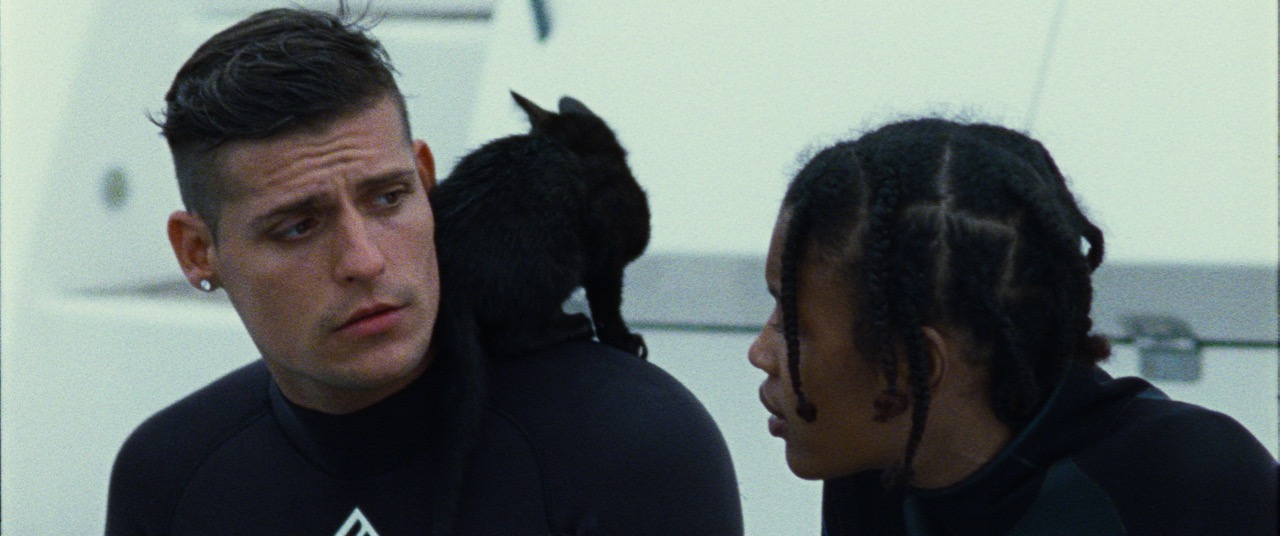 Thomas Beard
Thomas Beard
In a political satire, right-wingers try turning a soccer star into
“the Christian savior of the Portuguese race.”

Diamantino. Image courtesy Kino Lorber.
Diamantino, written and directed by Gabriel Abrantes and Daniel Schmidt, opening May 24, 2019, at Metrograph, 7 Ludlow Street, New York City; and May 31, 2019, at Brooklyn Academy of Music,
30 Lafayette Avenue, Brooklyn
• • •
In his 1994 essay “How Tracy Austin Broke My Heart,” David Foster Wallace grapples with the profound disappointments of reading the former tennis phenom’s coauthored memoir, wherein her tragic career arc, the story of a prodigally gifted teen athlete derailed by injury and accident, is articulated through a deadening parade of clichés that also betrays a stunning naivete about the flows of corruption streaming through professional sports. Of course, to be let down by the fact that Austin’s brilliance on the court doesn’t translate to the page, Wallace notes, would be as ridiculous as lamenting Kant’s lack of boxing prowess. Yet in this most banal of autobiographies he arrives at a deeper revelation, “that those who receive and act out the gift of athletic genius must, perforce, be blind and dumb about it—and not because blindness and dumbness are the price of the gift, but because they are its essence.”

Carloto Cotta as Diamantino Matamouros in Diamantino. Image courtesy Kino Lorber.
The piece would serve as a key inspiration for Gabriel Abrantes and Daniel Schmidt’s remarkable satire Diamantino, a fool’s journey narrated by its eponymous protagonist, the world’s greatest soccer player, a figure possessed with preternatural physical grace and the mind of a child. “We wanted a simple, iconic, charismatic main character—like Balthazar in Au Hasard Balthazar,” Abrantes has explained, and Carloto Cotta deftly embodies the leading role as guileless emblem: a man of extravagant wealth who doesn’t realize he’s being fleeced, a sex symbol who’s fully unaware of carnal appetites. Diamantino is, most crucially, an image, ripe for easy manipulation and ready for mass distribution, a symbol ubiquitous but almost entirely outside his own control. Just as Balthazar did, Cotta brings to the performance a considerable, wide-eyed pathos (though while the star of Diamantino has frequently collaborated with great auteurs such as Miguel Gomes and João Pedro Rodrigues, Bresson’s donkey, by contrast, in strict adherence to the director’s philosophy of working with non-actors, was untrained).

Carloto Cotta as Diamantino Matamouros in Diamantino. Image courtesy Kino Lorber.
The film begins with the Ronaldo-ian champion in his element, at a World Cup semifinal, in the game’s tense final moments, poised to score the winning goal. It’s a familiar scene—indeed the most familiar scene in every sports movie—yet what follows immediately announces Abrantes and Schmidt’s delirious style, their ability to weld together disparate genres and deform hackneyed tropes into an idiom all their own. As Diamantino focuses his attention, the roaring crowds and field of competitors fade away. Here, as in every match, all he can see are “the puppies”—a pack of gigantic, stampeding Pekingese kicking up a cotton candy–pink dust storm—which he dribbles around in a state of innocent reverie. The movie is replete with absurdist, chroma-key wonders, which are all the more impressive given the limited resources at hand. Along with the film’s many Hackers-esque renderings of computer interfaces, futuristic and throwback at once, these goofy interventions are a vital reminder that ingenious digital effects in narrative feature filmmaking are not the exclusive domain of Marvel Cinematic Universe dreck. (Move over, Terrence Malick’s dinosaur!)

Carloto Cotta as Diamantino Matamouros, Mittens the kitten, and Cleo Tavares as Aisha Brito in Diamantino. Image courtesy Kino Lorber.
After these first minutes, Diamantino grows only more bizarre. While relaxing on his yacht after the recent victory, and looking forward to the final, the champ rescues a drifting boat of refugees. Their sorrows, like most things of this world, had before been completely unknown to him, and his freshly awakened compassion shakes him so thoroughly that he later chokes during a decisive penalty kick, losing Portugal the World Cup and becoming an endlessly ridiculed meme sensation in the process (“TFW SHE / FRIENDZONES YOU,” reads the text on a post of the hero’s weeping visage). His ruined career, compounded by the sudden death of his beloved father, leaves Diamantino aimless and alone, finding solace only in Bongo juice and his kitten, Mittens. But this is no matter, because everyone else in the film has plans for him.

Anabela and Margarida Moreira as Sonia and Natasha Matamouros in Diamantino. Image courtesy Kino Lorber.
His twin sisters (played by Anabela and Margarida Moreira), with their matching outfits, synchronized smoking, and terrifyingly taut ponytails, are so deliciously vile that they rival the smug, self-serving siblings in another great fairy-tale picture, Jean Cocteau’s La belle et la bête, and they jump at the opportunity to sell him out to a right-wing movement that seeks to make Diamantino the unwitting face of its propaganda. This elaborate initiative involves casting him as King Sebastião, “the Christian savior of the Portuguese race,” in a xenophobic, anti-EU ad campaign and, rather grandly, cloning him many times over, with the help of “Lamborghini Genetics,” to cultivate an unbeatable, nationalism-bolstering soccer team. The experimental procedures, however, which entail pumping him full of clownfish hormones, have the unexpected side effect of making him grow breasts. Meanwhile, in another twist of gender variance, a pair of sapphic intelligence agents investigating Diamantino for money laundering decide to go undercover as a nun and an orphaned Mozambican boy, in an effort to get inside his mansion after he announces on a talk show that he’d like to adopt a refugee. (“Where will the ‘fugee’ come from?” the host asks. “Anywhere . . .,” he replies. “Maybe Canada?”)

Carla Maciel as Dr. Lamborghini in Diamantino. Image courtesy Kino Lorber.
Bioethics, offshore banking, the surveillance state, celebrity in the age of social media, the politics of immigration—Diamantino is, through its expansive menagerie of subjects as well as its formal maneuvers, a relentlessly contemporary work of art. As recent cinema attests, there lies a danger, in an all-encompassing quest for the new, of trying to capture so thoroughly the particulars of a moment that they deliquesce rapidly into damp period curiosities. This, thankfully, is not the case in Diamantino, a work whose baroque designs belie an elegant coherence of purpose. Voltaire, in Candide, offered an ageless parody while being caught up in the crises of his era (the “beautiful auto-da-fé” in response to the Lisbon earthquake), and so too do Abrantes and Schmidt, complete with their own naïf. Their film is ferociously funny, but it’s also a fever dream of a present wrecked by capitalism and its attendant calamities, a nightmare we’ll likely be living with, and fighting against, for some time to come.
Thomas Beard is a founder and director of Light Industry, a venue for film and electronic art in Brooklyn, and a programmer at large for Film at Lincoln Center. He was the co-curator for the cinema programs at the 2012 Whitney Biennial and Greater New York 2010 at MoMA PS1, and has organized screenings for Artists Space, Harvard Film Archive, the Metropolitan Museum of Art, the Museum of Modern Art, and Tate Modern.